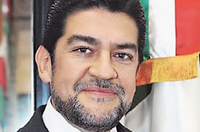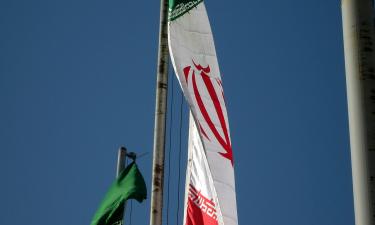Over two thirds of all violent deaths in Mexico are drug-related
Pravda.Ru has recently received the letter from Alfredo Pérez Bravo, the Ambassador of Mexico to the Russian Federation, who commented the situation around Mexico's fight against organized crime. His comments were caused by one of the articles published in Pravda.Ru Opinion section.

“Allow me to refer to the article "America's next catastrophe is brewing just south its borders" by Stanislav Mishin appeared on 12th March 2009, to share with you some elements to take into consideration regarding the situation around Mexico's fight against organized crime.
Not a day goes by without a newspaper or news agency somewhere around the globe publishing a report of a violent incident in Mexico. The story can be current, recycled or even an old one. The impact is nevertheless the same: from reading these reports in isolation and without proper context, one can easily assume that violence is widespread in Mexico. Except that it is not.
Over two thirds of all violent deaths in Mexico are drug-related. More than half of these regrettable killings have taken place in only four of the country's more than 2,400 municipalities. Almost 90% of the dead were members of cartels or involved in drug trafficking. The vast majority of the rest has been law enforcement officials. Even with an unacceptably large drug-related death toll, the murder rate in Mexico remains relatively low by world standards: 11 per 100,000 inhabitants.
Statistics are relevant. But no matter how accurate they are, public opinion has a tendency to dismiss them, particularly if they come from governmental sources. And in a world where multimedia is king, statistics can hardly compete with compelling footage in shaping opinion. So, what is really behind the gruesome images of drug-related violence that are making the rounds in newscasts around the world?
Miami, the then main gateway to the huge US market for illegal drugs, was successfully closed as such in the 80's. But as long as there was demand for them, illegal drugs behaved like water: if you close its course here, it finds another path somewhere else. The gateway might indeed have been closed, but demand remained as high as ever, street prices increased and profit -and incentives- for traffickers skyrocketed. The result was that Mexico regretfully became a transit country. And we all know that once illegal drugs are in they have the capacity to corrode everything: a couple of decades down the line, consumption has also become a problem in Mexico and activities of traffickers managed to corrupt government officials and even some pockets of society.
Mexico has been paying for the presence of drug cartels in its territory and paying it dearly, even if the causes of this very complex phenomenon are multinational. Demand in industrialized countries is the driving force. Money-laundering around the world, its fuel. Arms smuggled into Mexico as a result of almost non-existent controls in the USA, the tools for violence and fear.
Consequently, at the outset of the current administration in Mexico, President Calderon clearly established as his top priority to confronting head-on the impending threat of drag trafficking to our society. The challenge had to be faced there and then.
The army, a highly respected institution with well trained and disciplined ranks, was called to lead the fight. It proved to be pretty successful pretty rapidly. Many cartels were severely hit, while the ability to operate of others was seriously undermined. The effect was two-folded: on the one hand, some cartels split in many smaller units -harder to fight-, while on the other, relatively stronger organizations tried to take advantage of the sudden weakness of their competitors by fighting for their areas of influence the only way organized crime does it, with extreme violence.
But drug cartels are fighting at the same time for their own survival and their response to the government's challenge has been fierce. They also know that in a globalized world, image and public opinion do matter. Perceptions sometimes are more important than reality and organized crime is trying to use distorted images to their advantage. On the one hand, they are trying to build for themselves an image of admired Rambo-like successful entrepreneurs. At the same time, they seek to spread fear among Mexicans (hence the very public displays of gruesome violence) and are skillfully using media to circulate the perception that the government is loosing the fight and, perhaps more importantly, to convey the impression that previous times were better (no head-on confrontation with organized crime, less violence), and that the decision to embark upon a struggle to contain drug trafficking was a mistake and should be reverted. International misperception has been a welcomed side-effect to the cartels' "public relations" strategy.
What are the facts? The results of the efforts of the current administration are simply impressive: record seizures (70 tons of cocaine, 4,000 tons of marijuana, 42 tons of chemicals for precursors for synthetic drugs, over 310 million dollars in cash); the apprehension of 57,000 presumed drug-related criminals -including 36 drug lords- and the extradition of more than 200 of those criminals; the successfuldismantling of several criminal organizations. But more importantly, the foundations are stronger and sounder than ever. Mexico is a vibrant democracy with the 13th largest economy of the world. It remains as one of the top destinations of foreign investment and is the 9th largest trading power in the world.
Dutch businesspeople are thoroughly satisfied with their operations in my country and keep increasing their presence. This is also true in the case of entrepreneurs from other parts of the world: in spite of the global economic crisis, new direct foreign investment to Mexico in the first two months of this troubled year reached almost 2 billion dollars. More than 23 million people from all over the world visit my country every year. The wanderlust nature of the Dutch has led the Netherlands to become the 8th largest country of origin of foreign visitors to Mexico. They get to see firsthand the reality of an extremely welcoming country with an incredibly rich cultural heritage and a thriving society looking ahead to a bright future. They come back home pleasantly surprised and become the best ambassadors that Mexico can have in this country.
A long term solution to the problem of drug trafficking can only come as a result of a majoi change of the international approach to it, that includes the stakeholders' commitment to sharing responsibility under a coordinated, multinational effort. Meanwhile the struggle is clearly worth it and to succeed in the short term we need Mexicans to stick together, but also the support of our friends and partners in the world.”
Alfredo Pérez Bravo, the Ambassador of Mexico to the Russian Federation
Subscribe to Pravda.Ru Telegram channel, Facebook, RSS!




